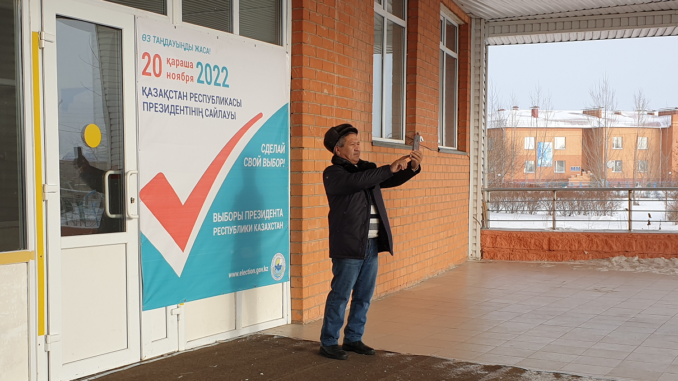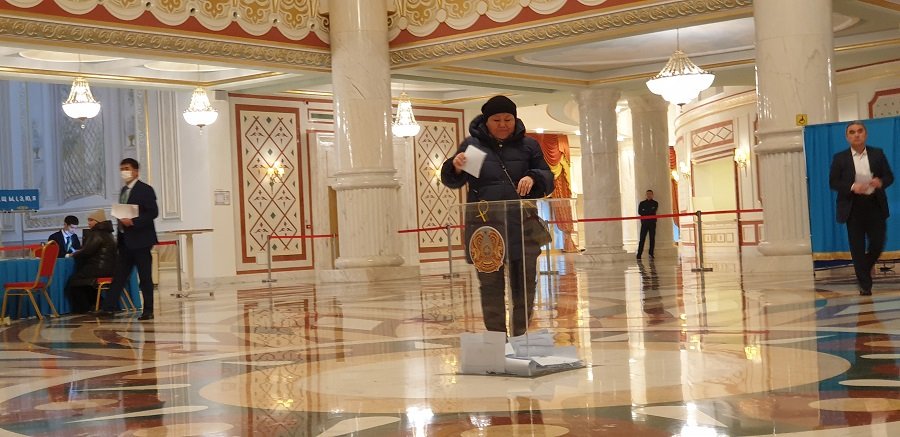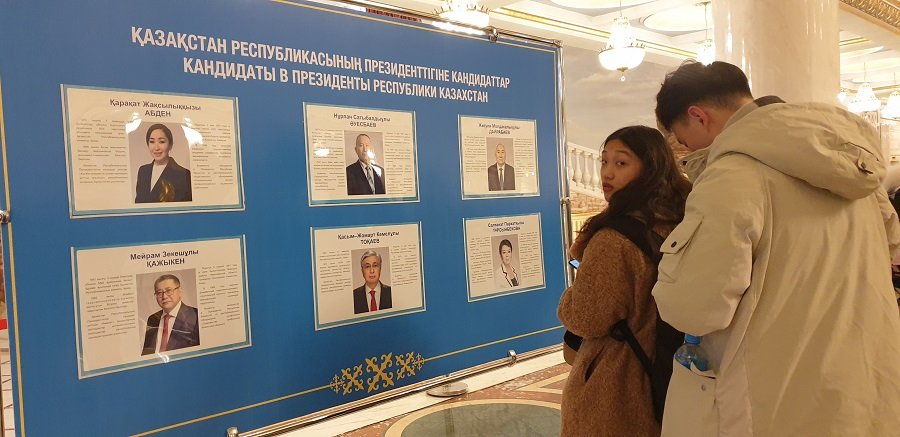
Early presidential elections took place in Kazakhstan on 20 November. The final results show that Kassym-Jomart Kemeluly Tokayev was elected for a second term as President with 81.31% of the vote. What does this election mean for the Republic of Kazakhstan, for the region and us, the West and Lithuania?
At first sight, nothing unexpected has happened. A landslide victory went to the incumbent head of state, K. Z. Tokayev. However, the Organisation for Security and Cooperation in Europe (OSCE), which monitored the elections, was critical. The OSCE stated that: ‘The snap presidential elections in Kazakhstan took place in a political environment that lacked competitiveness, and while the election was well prepared, it highlighted the need for further reforms to bring the relevant legislation and its implementation in line with the OSCE’s commitments to ensure genuine pluralism’.
Among the journalists invited to observe the elections, the debate was not about who would win the election but about who would come second. In addition to President Tokayev there were five other candidates, including two women. None of them won because the second most popular candidate was the “against all” candidate. 5.2% of the Kazakh electorate voted for this choice.

The OSCE also noted a lack of pluralism, or requirements for candidates regarding education, place of residence and experience in public service or elected public office. So, from the Western point of view, yes, there is room for improvement, to say the least. But is there the will in Astana to do so, or are efforts being made to build a New and Just Kazakhstan in words and deeds?
Kazakhstan’s Patriarch, Nursultan Nazarbayev, handed over the reins of power to his successor, the diplomat Tokayev in 2019. This Central Asian giant republic gained independence after the collapse of the Soviet Union in a surprise move of its own. Nazarbayev, the First Secretary of the Communist Party of Kazakhstan, took the helm of an independent republic that was predicted to collapse Soviet Union style. Nevertheless, the world’s ninth-largest country has managed to survive and build the most robust economy in the region.
The country’s political and economic life was concentrated in the strong hands of President Nazarbayev, his family and his inner circle. A relatively solid economic base has been built to maintain the stability of this enormous country. Control of the economy was concentrated in the hands of a dozen or so families close to the President, just as politics was managed in an intense style by the super-President Nazarbayev. For various reasons, in 2019, it was decided to hand over power to Tokayev, a civil servant without a strong background who has spent almost his entire life in the diplomatic service.

To understand why the Republic of Kazakhstan is where it is today, it is necessary to consider how the country lived before the tragic events of January 2022. Then, protests broke out because of the high fuel cost and turned into riots. During the suppression of these riots, 238 people died. The duplicity in the law enforcement structures meant that President Tokayev did not trust all of his own law enforcement structures. President Tokayev called on the Russian-dominated Collective Security Treaty Organisation (CSTO) to help. Although the organisation’s peacekeepers did not fire a single shot, the law-enforcement structures loyal to the President quelled the unrest. Unfortunately, many people were killed, including police officers.
The KSSO forces were withdrawn from the country, and stability returned. However, the events of January have shaken the Central Asian republic, hitherto known for its stability. Nevertheless, President Tokayev has cleverly seized the opportunity to eliminate the duplicity in Kazakhstan’s law enforcement structures. The events of January have highlighted those officials in the networks who were involved in the dual power schemes. This was a perfect opportunity to detain these individuals, thereby cleansing these structures. Another substantial effect of the events of January was the June referendum, which resulted in the amendment of one-third of the Constitution of the Republic of Kazakhstan. I have already written about the referendum in detail in this article.

However, one of the main objectives of the referendum is to lay a solid foundation for the modernisation and democratisation of the Republic of Kazakhstan. There are still many steps to be taken towards democratisation, but I would like to hope that the presidential election was the first step.
By implementing democratic reforms, Kazakhstan is not only moving away from the Russian Federation but is also gaining an antidote to the impending Chinese domination. It is to be hoped that Kazakhstan’s elite realises that the successful modernisation of the political, social and economic system will strengthen Kazakhstan’s sovereignty not only over Russia, which is on the path to enhancing autocracy, but also, in the near future, against China.
Yes, it has to be admitted that the impression is that the reforms are being initiated from the top. The tragic events of January have weakened the dual power structures in Kazakhstan and have been a serious kick in the bottom of the Kazakh establishment. The events of January made the establishment realise that the people of Kazakhstan are ready for change. And Russia’s war against Ukraine has made the establishment realise that if the Republic of Kazakhstan delays reforms and the political and economic modernisation of the country, they could lose not only their northern territories but also their entire state.
These two circumstances probably answer the question of why there is such a rush to reform from the top. It is likely that Ukraine’s heroic struggle for its freedom, which has been going on for ten months now, has also encouraged the establishment and the Kazakh people to become aware of the window of opportunity that is opening. A similar opportunity existed thirty years ago, when the window of opportunity opened, i.e. when Russia was weakened, and the countries of the former Warsaw Pact and the Baltic States took advantage of it. Due to historical and geographical circumstances, we have managed to escape from Russia’s embrace. Thanks to the sacrifice of the Ukrainian people, such a window of opportunity has opened not only for Ukraine but also for the remaining republics of the former Soviet empire. As was the case thirty years ago, some countries are ready for this, and others are not yet ready, but the window of opportunity has opened.
When I talk to the Kazakhstanis, I get the impression that they understand the importance of this window of opportunity and that Kazakhstan needs to change. But, of course, no one is under any illusions. The neighbouring country to the north, with which Kazakhstan shares almost the longest border in the world (only the US-Canada land border is 44 km longer), has been and will remain one of Kazakhstan’s most important partners. But taking advantage of this open window will help to strengthen the country’s sovereignty and independence as much as possible. And it is the modernisation of the country’s political and socio-economic system will strengthen Kazakhstan’s independence.

I have been hearing many concerns that President Tokayev’s reforms in Kazakhstan are merely cosmetic, ceremonial, aimed only at redistributing the ‘Kazakhstan cake’ and consolidating his personal power. Nevertheless, it would be difficult to call this June’s referendum, which changed a third of the constitution, a cosmetic reform of Kazakhstan’s political, legislative and economic system. What is more, it is not only talking but also doing. Since the referendum, reforms such as the creation of a Constitutional Court, the radical relaxation of the registration statutes for political parties, the restructuring of the parliament, and steps towards transforming the country from a supra-presidential republic into a presidential-parliamentary republic have been implemented. The way has been blocked for a ‘perpetual president’: under the new constitution, the President is elected for a single, seven-year term without the possibility of immediately standing for the next presidential election.
Presidential elections should be seen as a continuation of the reforms laid by the referendum. The next stage of the reforms will be early parliamentary elections in the summer of 2023. Is it worth listening to President Tokayev’s action plan to implement his electoral programme, which he approved on 26 November? For example, there is something there about modernising politics. This programme provides for the introduction, by 2024, of new institutions for the protection of citizens’ rights and freedoms, such as the Constitutional Court, the Human Rights Ombudsman and the Ombudsman for Children’s Rights. By June 2023, parliamentary and maslihat (local government) elections should be held under the new electoral system. It also promises to create favourable conditions for inter-party dialogue, healthy political competition and a mature and responsible electoral culture.
The aim is to improve the legal system by establishing objective and independent courts, including the extension of jury trials, alternatives to imprisonment, the equal status of judges and reforming the appeals system. Protection of citizens’ rights will also be strengthened, including measures to prevent torture and other unlawful methods of investigation and to develop a professional service-oriented model for the Kazakh police. A revision of the Criminal Code and the Code of Criminal Procedure will be initiated to enhance the protection of citizens’ rights and ensure their safety, further measures to fight corruption, and stricter liability for domestic and family violence.
Reforms are also foreseen in the economic sphere. Fair and predictable economic policies will be pursued, with a reduction of the informal economy to OECD standards and a reduction of the state’s share in the economy to 14% by 2025. In addition, there is a promise of continued economic demonopolisation, protection of competition, and adoption of a new Tax Code to ensure fair, transparent and predictable taxation. It will also aim to increase the number of people working in small and medium-sized enterprises to 4.7 million. Other areas include open transport corridors and logistics, including the development of the international Trans-Caspian route, reliable energy, strong regions and infrastructure, including new housing and roads, and new digital opportunities, including the development of Kazakhstan as a regional digital hub.
With the modernisation of the economy, there are also enormous opportunities for Lithuanian businesses. The capital Astana is already regularly visited by representatives of European Union (EU) governments and enterprises. Lithuanian Foreign Minister Gabrielius Landsbergis is also visiting Kazakhstan these days. A large delegation of influential business people accompanies him. One of the members of this delegation is Vidmantas Janulevičius, President of the Lithuanian Confederation of Industrialists. “Lithuania has already done a lot of homework with other countries to ensure that the EU guarantee will be in place – a strategic agreement was signed with Kazakhstan on the extraction of raw materials. This is already the basis for bolder bilateral relations and safer investment,” he said to Verslo žinios newspaper a few days ago.
Will the modernisation and liberalisation of Kazakhstan launched by President Tokayev be successful? We do not know. Are these reforms sincere? I would like to believe so, because words and deeds, at least for the time being, coincide. Will there be a ‘celebration of democracy in Kazakhstan that meets Western standards at the early parliamentary elections in 2023? It will certainly not. The country is still taking its first steps towards democracy. We, as a country, took the first steps towards democracy a hundred years ago; Kazakhstan is taking the first steps only now. We, with very different traditions and experiences, have had a difficult road to travel; Kazakhstan’s journey will be even more difficult and longer.
Do we know where the journey that has just begun will take Kazakhstan? We do not know, but we would like to see as little as possible of the influence of authoritarian neighbours and as much as possible of the rule of law, pluralism, freedom of the press, human rights, and as much as possible of a more liberal economic and political system in this critical Central Asian country. Kazakhstan’s demography is optimistic: almost 36% of Kazakhstan’s population is made up of young people aged between 15 and 39 years. It is a new republic and a young republic with enormous potential.
We, as Lithuania, the bearer and advocate of liberal democracy, must have realistic expectations of the Republic of Kazakhstan. Let us rejoice in a country that has chosen the path of modernisation and is making efforts to reduce Russian influence. Let us encourage and support the Kazakhstanis on this path, which is very important to them. Kazakhstan’s success in reforming and taking the path of modernisation and democratisation must also be important to us, to Lithuania and, in general, to the whole of the Western world.
This trip to observe the early presidential elections on 20 November was organised by the Embassy of the Republic of Kazakhstan in Vilnius. However, this fact has not influenced the content of this text.

Be the first to comment